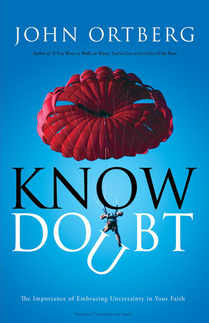BOOK REVIEWS
-

KNOW DOUBT: THE IMPORTANCE OF EMBRACING UNCERTAINTY IN YOUR FAITH
By: John Ortberg
Publisher: Zondervan (2009)
ISBN-10: 031032503X ISBN-13: 978-0310325031
This book is actually a new edition of the book originally published as Faith & Doubt (Zondervan, 2008). Although we often think of doubt as the opposite of faith, pastor and writer John Ortberg makes the case that the nature of faith itself requires the presence of uncertainty.
Trained in both divinity and clinical psychology, Ortberg is well equipped to look at this conundrum, but the result is far from a dry academic treatise. Ortberg examines his topic with the characteristic humor and openness that readers of his other books will know and enjoy. But the book is not a shallow read, either.
Ortberg’s central point, regarding faith and doubt, revolves around the question “What if the most important word is the one in the middle?” He convincingly shows that we should stop berating ourselves for moments of doubt or confusion in our spiritual lives and realize that doubts are in fact part of the process of growth. The book looks at many aspects of this reality and reaches its core in Chapter 9 “The Gift of Uncertainty,” which considers the following proposals: Doubt Makes Trusting Possible, Uncertainty Adds Humility to Faith, Uncertainty Causes Us to Learn, Uncertainty Pushes us to Seek Truth, and Uncertainty Produces Growth.
Some readers may not agree entirely with Ortberg’s treatment of the need for a “leap of faith” or with the use of some small analogies or concepts such as the quote from Buechner: “Almost nothing that makes any real difference can be proved,” but the underlying psychology of the book is good; and it succeeds where many have failed in their unrealistic approach that doubt is wrong, unnecessary or just plain spiritually immature.
Another aspect that some readers may find frustrating is the lack of focus on the various kinds of doubt that we might experience. Doubt is seldom monolithic or always experienced in the same way. We may feel occasional doubts regarding God’s existence or nature, His treatment of the world, His love or willingness to work with us individually, or whatever – Anything that can be believed can be doubted. Not all these types of doubt can be treated in one book, of course, but we sometimes have to be satisfied with a discussion of generic “doubt,” where specific cases might benefit from more specific answers.
Overall, however, Know Doubt is completely successful in the way it puts Christian doubt in perspective. It mixes biblical principles with personal anecdotes in a manner that makes reading easy and enjoyable, while constantly teaching. Of particular importance, the book shows that many of God’s servants experienced doubts – sometimes serious ones – but that they nevertheless accomplished great things and actually became examples and pillars of faith. Know Doubt is neither a theological treatise nor a textbook on faith and doubt, but it cogently makes its case that doubt is something that can be admitted and used in the growth of ever-strengthening faith.
Trained in both divinity and clinical psychology, Ortberg is well equipped to look at this conundrum, but the result is far from a dry academic treatise. Ortberg examines his topic with the characteristic humor and openness that readers of his other books will know and enjoy. But the book is not a shallow read, either.
Ortberg’s central point, regarding faith and doubt, revolves around the question “What if the most important word is the one in the middle?” He convincingly shows that we should stop berating ourselves for moments of doubt or confusion in our spiritual lives and realize that doubts are in fact part of the process of growth. The book looks at many aspects of this reality and reaches its core in Chapter 9 “The Gift of Uncertainty,” which considers the following proposals: Doubt Makes Trusting Possible, Uncertainty Adds Humility to Faith, Uncertainty Causes Us to Learn, Uncertainty Pushes us to Seek Truth, and Uncertainty Produces Growth.
Some readers may not agree entirely with Ortberg’s treatment of the need for a “leap of faith” or with the use of some small analogies or concepts such as the quote from Buechner: “Almost nothing that makes any real difference can be proved,” but the underlying psychology of the book is good; and it succeeds where many have failed in their unrealistic approach that doubt is wrong, unnecessary or just plain spiritually immature.
Another aspect that some readers may find frustrating is the lack of focus on the various kinds of doubt that we might experience. Doubt is seldom monolithic or always experienced in the same way. We may feel occasional doubts regarding God’s existence or nature, His treatment of the world, His love or willingness to work with us individually, or whatever – Anything that can be believed can be doubted. Not all these types of doubt can be treated in one book, of course, but we sometimes have to be satisfied with a discussion of generic “doubt,” where specific cases might benefit from more specific answers.
Overall, however, Know Doubt is completely successful in the way it puts Christian doubt in perspective. It mixes biblical principles with personal anecdotes in a manner that makes reading easy and enjoyable, while constantly teaching. Of particular importance, the book shows that many of God’s servants experienced doubts – sometimes serious ones – but that they nevertheless accomplished great things and actually became examples and pillars of faith. Know Doubt is neither a theological treatise nor a textbook on faith and doubt, but it cogently makes its case that doubt is something that can be admitted and used in the growth of ever-strengthening faith.